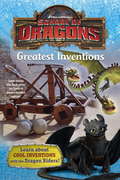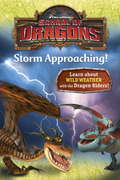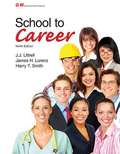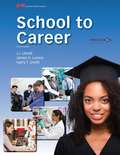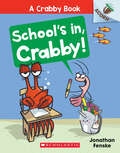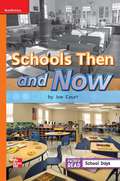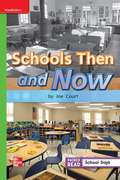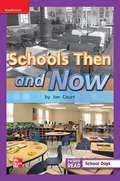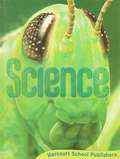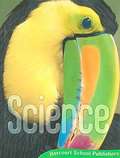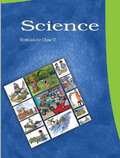- Table View
- List View
School of Dragons #2: Greatest Inventions (DreamWorks Dragons)
by Random House Nancy CastaldoAn all-new nonfiction series featuring DreamWorks Dragons! Hiccup, Toothless, and other exciting characters from DreamWorks Dragons help readers learn all about ancient and modern inventions--even some amazing inventions created by kids! Filled with full-color photos and lots of fun facts, these 80-page books based on JumpStart's School of Dragons online game are the perfect way to help young readers soar into the world of nonfiction.
School of Dragons #3: Storm Approaching! (DreamWorks Dragons)
by Random House Kathleen Weidner ZoehfeldAn all-new nonfiction series featuring DreamWorks Dragons!Hiccup, Toothless, and other exciting characters from DreamWorks Dragons teach readers about tornadoes, blizzards, hurricanes, and more of Earth's deadliest weather! Filled with full-color photos and lots of fun facts, these 80-page books based on JumpStart's School of Dragons online game are the perfect way to help young readers soar into the world of nonfiction.
School to Career
by Harry T. Smith J. J. Littrell James H. LorenzSchool to Career helps prepare students to achieve success in high school, college, career, and life. In this text, students are presented with information they need today to make career choices tomorrow. In order to prepare students for their future, twenty-first century life and career skills are introduced in the text as well as personal skills, decision-making skills, technology skills, and employability skills. Skills for success such as teamwork and problem solving, communicating on the job, and leadership are also covered. Opportunities are presented to research careers using the 16 national career clusters, as established by the States' Career Clusters Initiative, to help define future goals. As part of the learning process, students will assess graduation plans and explore college and other post-secondary programs that might help them reach their goals. College access and funding an education are also covered. School to Career is the first step for preparing for the challenges faced after graduation. By studying this text, students will be able to make the most of their study time and learn how to prepare for the future.
School's In, Crabby!: An Acorn Book (A Crabby Book)
by Jonathan FenskeSchool is in session for the ocean's crankiest crab!Pick a book. Grow a Reader!This series is part of Scholastic's early reader line, Acorn, aimed at children who are learning to read. With easy-to-read text, a short-story format, plenty of humor, and full-color artwork on every page, these books will boost reading confidence and fluency. Acorn books plant a love of reading and help readers grow!It's just another day in the ocean for Crabby and Plankton -- until they find themselves INSIDE a school of fish! This gives Plankton a fabulous idea -- he and Crabby should play school! But Crabby does not want to play. In four hilarious stories, Crabby uses funny wordplay to distract Plankton from teaching.With comic speech bubbles and full-color artwork throughout, Geisel Award Honoree Jonathan Fenske's early reader series is sure to be a hit with new readers!
Schools Then and Now
by Cynthia Swain Tara FunkWhat were some schools like long ago? How are schools different today?
Science
by McGraw-HillScience textbook. As you read, you'll learn about the Methods of Science, the steps scientists follow to solve problems.
Science & Life Issues: Our Genes, Our Selves
by University of California at Berkeley Lawrence Hall of ScienceScience and Life Issues, or SALI, uses several kinds of activities to teach science. For example, you will design and conduct an experiment to investigate human responses. You will explore a model of how species compete for food. And you will play the roles of scientists learning about the causes of infectious disease. A combination of experiments, readings, models, debates, role plays, and projects will help you uncover the nature of science and the relevance of science to your interests.
Science (California Edition)
by Lucy Daniel Joanne Vasquez Jay Hackett Richard Moyer Pamela Stryker Prentice BaptisteBegin each topic with an Explore question. Then try an Explore Activity Read the Science Magazines. National Geographic World of Science is the first magazine in each unit. Answer fun questions about real-world facts Have fun solving Problems and Puzzles. Write in the Science Journal about what you learn Build your skills with Skill Builders. Use the Handbook for help.
Science (English Medium) class 6 - Karnataka Board
by National Council of Educational Research and TrainingThe Science - Sixth Standard textbook by the Karnataka Textbook Society, developed under NCERT guidelines, is designed to connect classroom learning with students’ everyday experiences. Emphasizing inquiry-based and activity-driven education, the book encourages children to observe, question, experiment, and reflect on the natural world. The curriculum covers a wide range of topics from food sources and components, plant and animal life, materials and their properties, to physical phenomena like light, motion, electricity, and magnets. Chapters are structured to include hands-on activities, relatable examples, and reflective questions, fostering both conceptual understanding and curiosity. The textbook also integrates essential values such as environmental awareness, scientific temper, and social responsibility. It features child-friendly characters like Paheli and Boojho to engage learners in a conversational tone throughout. Developed collaboratively by experts and educators, the book aims to support holistic development and lay a strong foundation in science for young learners, aligning with the vision of the National Curriculum Framework (2005) to create a joyful and meaningful learning environment.
Science (Grade #2)
by HarcourtHarcourt science covers science broadly in 3 topics namely life, earth and physical.
Science (Grade #5)
by Scott ForesmanInteractive Science is a next generation K-8 science program featuring an innovative write-in student edition (grades 1-8) that makes learning personal, relevant, and engaging.
Science (Grade 5, 3rd Edition)
by Peggy S. Alier Janet E. SnowYou have a textbook that is the culmination of decades of research, experience, prayer, and creative energy.
Science (Grade 8, South Carolina Edition)
by Mcdougal LittellMcDougal Littell Science pulls together units from the different categories of science to give you a broad picture of how scientists study nature. For example, physical scientists, earth scientists, and biologists might all study forces and their effects from different points of view.
Science (New York City Edition)
by Marjorie Frank Barbara Ten Brink Michael J. Bell Gerald H. Krockover Joyce C. Mcleod Carol J. Valenta Barry A. Van Deman Michael A. DispezioThis science textbook has been specially created for students in New York City. Inside there are Science Investigations, special features like Science Spin from Weekly Reader and lots of links for online exploration.
Science (Ohio Edition )
by HarcourtThis Science, Ohio Edition contains Earth and Space Sciences, Life Sciences, Physical Sciences, Ohio Expeditions, etc.
Science (Scott Foresman Science, 2003)
by Jim Cummins Timothy Cooney James Flood Barbara Kay Foots M. Jenice Goldston Shirley Gholston Key Diane Lapp Sheryl A. Mercier Karen L. Ostlund Nancy Romance William Tate Kathryn C. Thornton Leon Ukens Steve WeinbergNIMAC-sourced textbook
Science 10th Standard - Tamilnadu Board
by Training State Council of Educational ResearchScience Textbook for the 10th Standard Students preparing for Tamil Nadu State Board Exam.
